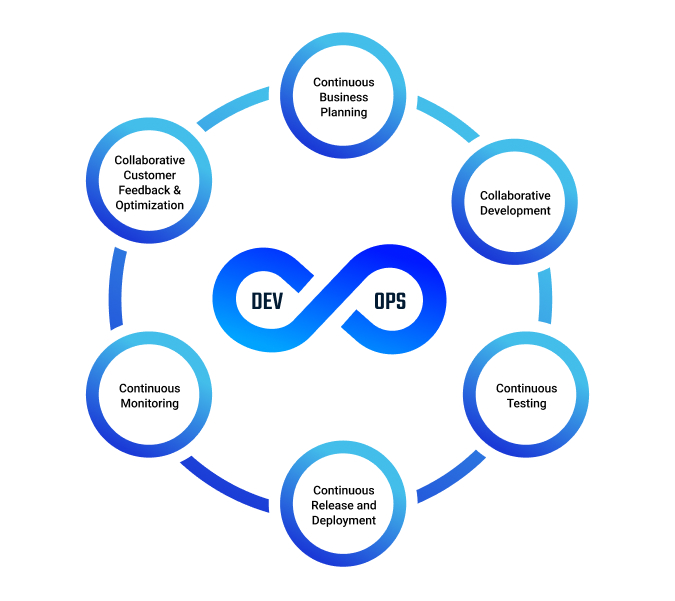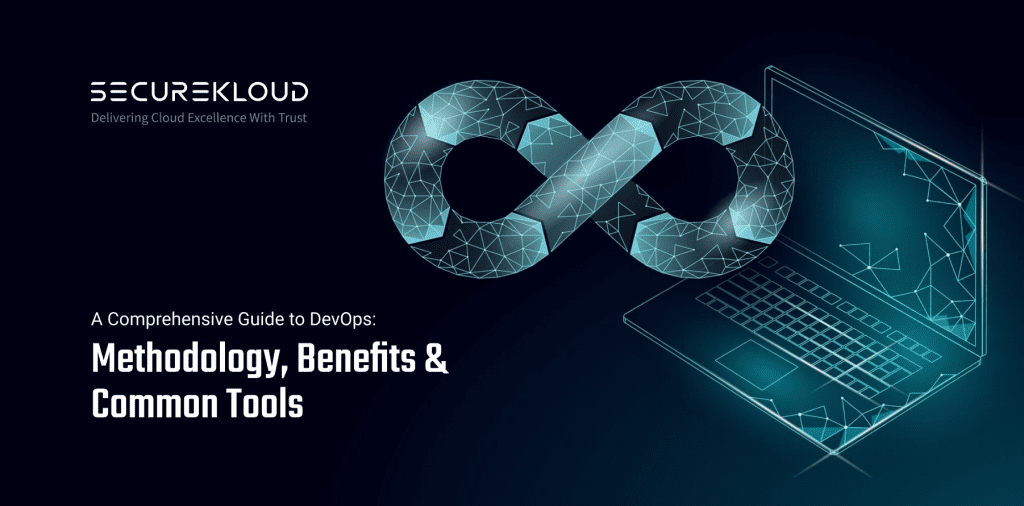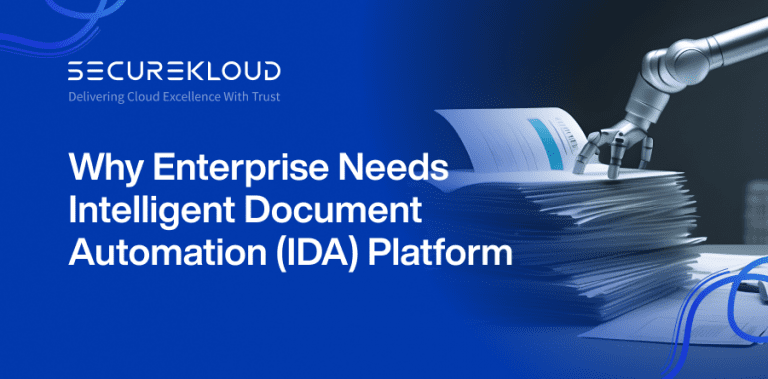- 6Minutes
- 1192Words
- 5Views
DevOps has become a common term in the IT world. Even so, many are still having only a vague idea of what exactly DevOps methodology does, why it’s needed, and how it works. Unlike the conventional software development processes, DevOps is a process that helps your organization to deliver applications and services at a much faster pace. Read this article to understand the basics of DevOps, the need for its implementation, the methodology involved, and how SecureKloud can help drive business results.
What is DevOps?
An amalgamation of the words, ‘development’ and ‘operations,’ DevOps is a software methodology that facilitates organizations in delivering services and applications in an agile manner. It is the set of practices, tools, and methodologies that connects the development, operations, and testing departments to automate all processes from build to deployment of an application. By adopting the DevOps methodology, organizations can serve their customers more efficiently, IT teams can ensure high-quality services are delivered, infrastructure codes are managed securely, and running systems are constantly stable.
Breaking away from the conventionally siloed teams involved in software development, the DevOps methodology focuses on embracing a collaborative approach. DevOps is also referred to as DevSecOps when security is the primary focus and the quality assurance team work in constant cohesion throughout the application development lifecycle.
Why You Should Invest in DevOps
As per recent studies, DevOps adoption will surpass USD 30 billion in the market by 2028, and this indicates how this philosophy will gain popularity in the next few years. What do you think is the reason for its growing popularity? Faster innovation, enhanced efficiency, and higher customer satisfaction are to name a few.
But why is DevOps important? Imagine your team gets to deploy a brand-new software application for which they work separately, lacking proper communication and with a slow process for testing and feedback. You have the perfect recipe for failure.
How can DevOps help your team in this scenario? By adopting the DevOps methodology, your team can shorten the application development life cycle by bringing 60% quicker results.
Let’s understand how DevOps practices deliver added value to its users.
| Before DevOps | After DevOps |
| Development and Operations teams work in silos | Development and Operations teams work collaboratively throughout the development life cycle |
| Building, testing, and publishing application artifacts will be a manual process | The process of DevOps completely focuses on automation and agility |
| Security is often an afterthought | Security is integrated into the DevOps lifecycle (DevSecOps) |
| Delayed software application deployments | Rapid delivery of software application |
| Increased recovery time in the event of a failure | Higher ability to stabilize failures |
| Unplanned code execution | Drives speedy execution of codes with continuous integration |
| Required constant manual monitoring of application performance | Automation of software development life cycle |
| High operational costs | Reduced operational costs |
DevOps Principles Explained


While the primary aim of DevOps is to accelerate the application development process, it’s all about focusing on consistency and continuity. The DevOps lifecycle involves the adoption of certain common principles such as continuous development, continuous integration, continuous monitoring, testing, feedback, continuous delivery, and deployment.
- Continuous Planning & Development
Continuous planning involves identifying the resources needed for testing, constantly adapting, evaluating progress, picking up the customer needs, and working on iterations as needed with agility. Once the planning is done, the DevOps team focuses on continuous development which facilitates collaboration between business, development, and test teams to deploy software applications continuously. The continuous development includes the process ranging from testing to integration to deployment. With continuous development strategy, your company can achieve faster innovation, continuous progress, and minimized risks. - Continuous Integration
Continuous integration (CI) is a common practice in the DevOps workflow. This methodology enables frequent code integrations and automatic builds. With continuous integration, developers will have access to up-to-date codes which helps them to quickly fix integration issues and bugs, thereby saving time and costly delays. By adopting the DevOps methodology, your overall integration efforts are reduced via integration tools and continuous feedback. - Continuous Testing
Once the codes are integrated it is highly essential to test if the codes are working fine. Hence, continuous testing helps your team to find and rectify any hidden bugs. In this stage, the code undergoes testing with test codes and the software application development will be completed within the expected timeline. - Continuous Monitoring & Feedback
It’s highly imperative to ensure that your entire application development process is error-free as it helps to avoid costly delays. Continuous monitoring is enabled through automation and further helps to provide continuous feedback. With an automated feedback system, your team will be notified in real-time about any bugs or inappropriate system behavior, increasing the overall reliability of the system. - Continuous Delivery
By automating the entire release process of the application, your team can ensure a smooth approach for delivery. With the continuous delivery (CD) process, any changes or new builds that have been confirmed can be released rapidly with just a single click.
Benefits of Adopting the DevOps Methodology
DevOps fortifies a collaborative environment that connects the development and operations team into a cohesive unit to work towards their common goals. This, in turn, helps your organization to launch error-free applications to your customers faster. Here are some top benefits of adopting DevOps methodology in your organization.
- Innovative work and faster release – Gain a competitive edge with quicker and timely software release cycles.
- Immediate resolution of issues – With DevOps, your team can achieve a faster feedback loop which helps to minimize the time required to solve issues.
- Better collaboration between teams – DevOps fosters mutual collaboration and dynamic communication between teams that are distributed globally.
- Faster threat detection – By adopting the principles of continuous testing and continuous monitoring, your development team can ensure that the issues are identified at an early stage and resolved faster.
- Maximized Automation – Automation eliminates human errors and speeds up the development process, thereby saving your team time and money.
Top DevOps Tools


- Git – A distributed version control system to track changes and is used for coordinating work among programmers collaboratively during software development.
- Selenium – An open-source software to automate testing for web applications.
- Nagios – A free and open-source computer software application that monitors systems, networks, and infrastructure.
- Puppet – A software configuration management tool that requires limited programming knowledge to use.
- Docker – Docker is a software platform that allows you to build, test, and deploy applications quickly.
- Jenkins – It is an open-source automation server that helps organizations to accelerate the software development process by automating it.
- Ansible – An open-source IT configuration management and deployment tool.
How SecureKloud Can Help
Your DevOps implementation journey will be tricky, but by now you would have understood that it’s certainly a challenge worth taking. Implementing and optimizing DevOps practices can help you achieve excellence in delivering high-quality applications at a rapid pace.
Not sure where to start or how to move forward with DevOps? SecureKloud’s DevOps-as-a-Service capabilities can help you to optimize your end-to-end DevOps process and get 10x quicker application deployment, 80% cost savings, and faster innovation! Contact us today to book a free consultation.





